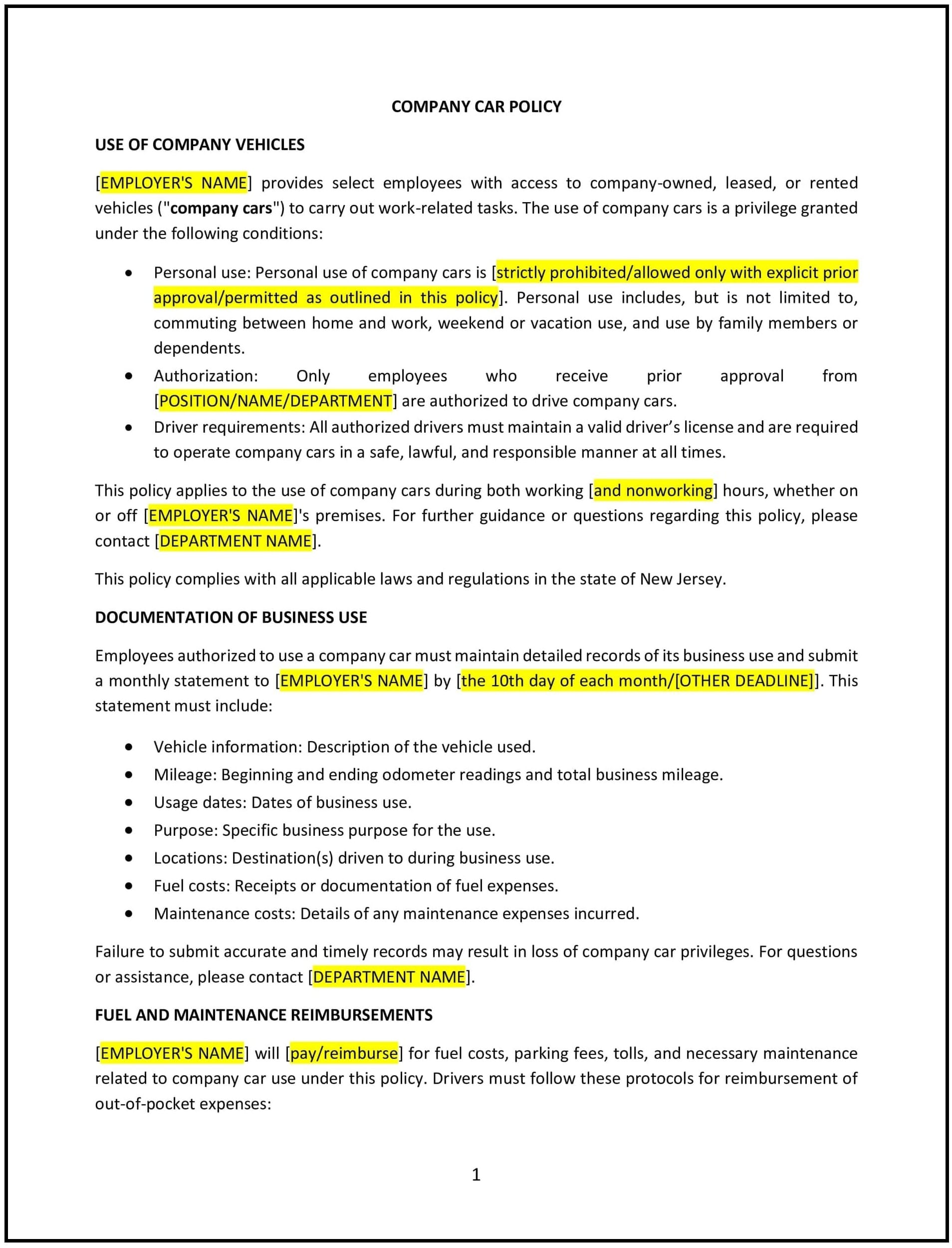Got contracts to review? While you're here for policies, let Cobrief make contract review effortless—start your free review now.

Customize this template for free
Company car (New Jersey)
A company car policy helps New Jersey businesses establish clear guidelines for the use of company-owned vehicles. This policy outlines eligibility, permitted uses, maintenance responsibilities, and safety requirements for employees who are assigned or authorized to use company vehicles. It also sets expectations for reporting accidents, fuel and mileage tracking, and vehicle security.
By adopting this policy, businesses in New Jersey can manage vehicle usage efficiently while ensuring accountability and safety.
How to use this company car policy (New Jersey)
- Define eligibility for company vehicles: Specify which employees may be assigned a company vehicle based on job roles, responsibilities, or business travel requirements.
- Establish permitted and prohibited uses: Outline when and how company vehicles may be used, including work-related travel, commuting, and personal use (if applicable). Prohibit unauthorized use, such as transporting unauthorized passengers or using the vehicle for non-business purposes without approval.
- Set vehicle maintenance and inspection expectations: Require employees to conduct routine vehicle checks, report mechanical issues promptly, and follow the company’s servicing schedule.
- Outline fuel and mileage reimbursement procedures: Specify whether fuel costs are covered by the company and how employees should track mileage for business-related trips.
- Provide accident reporting guidelines: Explain the steps employees should take in case of an accident, including notifying the company, law enforcement, and insurance providers.
- Address insurance coverage: Clarify what insurance the company provides and whether employees are responsible for any deductibles or additional coverage.
- Set safety requirements: Require employees to follow traffic laws, avoid distracted driving, and use seat belts at all times. Prohibit driving under the influence of drugs or alcohol.
- Detail return procedures: Explain how employees should return company vehicles when leaving the organization or changing job roles that no longer require a company car.
- Review and update: Regularly assess the policy to reflect changes in company vehicle use, safety regulations, and New Jersey-specific transportation laws.
Benefits of using this company car policy (New Jersey)
This policy provides several benefits for New Jersey businesses:
- Promotes responsible vehicle use: Establishes clear expectations for employees regarding company car usage.
- Reduces operational costs: Encourages proper vehicle maintenance and responsible fuel use to minimize expenses.
- Enhances safety: Reinforces safe driving practices and reduces the risk of accidents and liability.
- Protects company assets: Ensures company vehicles are well-maintained, secure, and used appropriately.
- Streamlines accident and insurance procedures: Provides employees with clear steps to follow in case of an accident, reducing delays and liability risks.
Tips for using this company car policy (New Jersey)
- Communicate the policy clearly: Ensure employees understand their responsibilities regarding company vehicle use, maintenance, and safety.
- Monitor vehicle use: Track mileage, fuel usage, and maintenance reports to maintain accountability.
- Enforce safety measures: Require employees to follow traffic laws and company-specific driving policies.
- Provide training: Offer driving safety courses or refresher sessions for employees who operate company vehicles regularly.
- Review the policy periodically: Update the policy to reflect any changes in New Jersey transportation laws or company vehicle management practices.